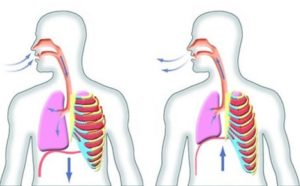
NCERT Solutions for Class 7 Science
Chapter number 10: Respiration in organisms
Below we have shared the NCERT Solutions for Class 7 Science. These are the NCERT solutions for chapter No. 10 Respiration in Organisms. We have also given the tables and diagrams wherever necessary.
Q.1. Why does an athlete breathe faster and deeper than usual after finishing the race?

The cells of the human body require oxygen to function. When an athlete runs the shortage of oxygen hence anaerobic respiration occurs in his body. So to fulfill the demand of oxygen he breathes faster and deeper when the race ends.
Q.2. List the similarities and differences between aerobic and anaerobic respiration
Similarities
1. Both the processes takes place inside the cell
2. Energy is released whenever any of the processes occurs
Differences
Aerobic respiration
It takes place in the presence of oxygen
A large amount of energy will be released
This process takes more time as compared to anaerobic respiration
It occurs in plant and animal cells
Anaerobic respiration
It is done in the absence of oxygen
The amount of energy released is less as compared to the aerobic respiration
The process takes place faster as compared to the aerobic respiration
It takes place in bacteria and the cells of the human body
Q.3 Why do we often sneeze when we inhale a lot of dust laden air?
Nose has an inner lining. dust Laden particles may contain bacterias and other microorganisms. Whenever we inhale dust or something the inner lining of nose gets irritated and as a result, we sneeze.
NCERT Solutions for Class 7 Science
Q 4. Take three test tubes. Fill each of them with water. Label them as a B and C. Keep a snail in test tube A, water plant in test tube B and in C, keep both Snail and the plant. Which test tube will have the highest concentration of CO2?
Test tube a will be having highest amount of oxygen. Let us understand why. Snail is kept inside test tube A so it will inhale all the oxygen present in the test tube and in return CO2 will be exhaled by it.
NCERT Solutions for Class 7: More Questions
Q.5 Tick the correct answer
In cockroaches, the air enters through:-
Lungs
Gills
Spiracles
Skin
Ans: c Skin
(b) During heavy exercise we get cramps in the legs due to the accumulation of
Carbon dioxide
Lactic acid
Alcohol
Water
Ans: lactic acid
(C) The normal range of breathing rate per minute in an average adult person at rest is

9 to 12
15 to 18
21 to 24
30 to 33
(d) During exhalation the ribs
Move outwards
Move downwards
Move upwards
Do not move at all
Ans. Move downwards
Q.6. Match the items in column 1 with those in column 2
| Column 1 | Column 2 |
|---|---|
| Yeast | Earthworms |
| Diaphragm | Gills |
| Skin | Chest Cavity |
| Leaves | Stomata |
| Fish | Lungs and Skin |
| Frog | Trachea |

Q.7 Mark the T if the statement is true and mark F if the statement is false
(1) during heavy exercise the breathing rate of a person slows down (T/F)
2) plants carry out photosynthesis only during the day and respiration only during the night
3) frogs breathe through their skin as well as their lungs
4) the fishes have lungs for respiration
5) the size of chest cavity increases during inhalation
Ans
1)F
2)F
3)T
4)F
5)T
NCERT Solutions for Class 7 Science :–
Q.8 Given below is a square of letters in which are hidden Different Birds related to respiration in organisms. 20 words may be present in any direction of birds downwards or along the diagonals. Find the words for your respiratory system. Clues about those words are given below the square.
1) The air tubes of insects
2) skeletal structure surrounding the chest cavity
3) muscular floor of chest cavity
4) Tiny pores on the surface of leaves
5) small openings on the sides of the body of an insect
6) the respiratory organs of human beings
7) the openings through which we inhale
8) An anaerobic organism
An organism with tracheal system
Ans:-
Trachea
Ribs
Diaphragm
Stomata
Spiracles
Lungs
Nostrils
Yeast
Ant
Q.9) The mountaineers carry oxygen with them because:-
a) at an altitude of more than 5 kilometre there is no air
b) the amount of air available to a person is less than that available on the ground
C) the temperature of air is higher than that on the ground
d) the pressure of air is higher than that on the ground
Ans: The mountaineers carry oxygen with them because the amount of air available to a person is less than that available on the ground
NCERT Solutions for Class 7 Science: Chapter 9 Soil
Q1. Tick the most suitable answer in question 1 and 2
In addition to the rock particle, the soil contains
a)Air and water
b)Water and plants
c)minerals organic matter and water
d)water air and plants
Ans: Apart from Rock particles the soil contains organic matter water and Minerals in it
Q2. The water holding capacity is the highest
a) Sandy soil
b) Clayey soil
c) Loamy soil
d) Mixture of sand and loam
Ans the water holding capacity is the highest in clay soil
Q.3 Match items in the column with those in column 2
| Column 1 | Column 2 |
|---|---|
| A Home for living organisms | All kinds of soil |
| Upper layer of soil | Dark in Colour |
| Sandy Soil | Large particles |
| Middle layer of Soil | Lesser amount of humus |
| Clayey Soil | Small particles and tightly packed |
Q4 Explain how soil is formed.
The formation of soil takes place because of weathering. In weathering chemical decomposition of minerals and rocks takes place. Physical breakdown also happens. There are various reasons which are involved in the process of weathering like wind water and the climate. Soil formation it is a slow process. With the passage of time large dog pieces gets converted into small pieces of rocks and form the soil
Q5 How is clay soil useful for crops?
Clay soil contains a lot of organic matter and it has a high capacity of retaining the water. that is why this soil is preferred for the growth of crops like wheat and gram
Q.6. Differentiate between clay soil and loamy soil
| Clay Soil | Loamy Soil |
|---|---|
| Particles are much smaller in it | Larger particles are present in this soil |
| Fertile in nature | Non fertile in nature |
| Particles are packed in a tight manner | Here the particles are loosely packed |
Q7. Sketch the cross section of soil and label the various layers
Q.8 Razia conducted an experiment in the field related to the rate of percolation. she observed that it took 40 minutes for 200 ml of water to percolate through the soil sample. Calculate the rate of percolation
Ans8. Amount of water = 200 mL
Time taken for percolation = 40 minutes
Percolation rate = amount of water contained
/ Time taken in percolation
= 200/ 40
= 5 mL/ min
Q9 Explain how soil pollution and soil erosion could be prevented
Prevention of soil pollution
1.Proper disposal of waste materials. Note throwing garbage and plastic bags here and there
2. Creating awareness among people for soil pollution prevention
3. Using organic manure and fertilizers instead of using Chemicals that cause a lot of damage to the soil
How to prevent soil erosion
1. Planting more and more trees
2. Creating awareness among the people to reduce deforestation and the industrial works carried out around the forest areas
Q10. Solve the following Crossword Puzzle with the clues given
2. Plantation prevents it
5. Use should be banned to avoid soil pollution
6. Type of soil used for making pottery
7. Living organism in the soil
Down
1. In desert soil erosion occurs through
3. Clay and loam are suitable for cereals like
4. This type of soil can hold very little water
5 . Collective name for layers of soil
Ans:
Across
2. Erosion
5. Polythene
6. Clay
7. Earthworm
Down
1. Wind
3. Wheat
4. Sandy
So, these were the NCERT Solutions for Class 7 Science for chapter 10 Respiration in Plants and Animals. You can learn the answers from here.If you feel we have missed something, feel free to tell us through the comments section given below. Follow us on Facebook to get Free NCERT solutions PDF and Sample Papers
Latest posts by Deepak Kumar (see all)

Leave a Reply